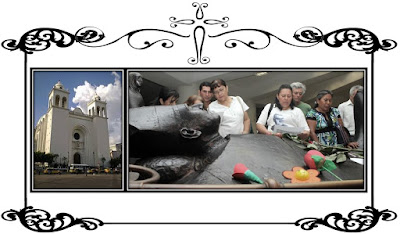BEATIFICATION OF ARCHBISHOP ROMERO,
MAY 23, 2015
|
||
|
|
||
The Archdiocese of San Salvador has published a list of churches where the faithful can obtain a plenary indulgence during the Year of Mercy declared by Pope Francis. Several of the temples have links to Blessed Archbishop Oscar Romero, especially the five that follow, which allow Salvadoran and foreign pilgrims to approach Blessed Romero during the Holy Year and trace his footsteps.
This was Archbishop
Romero’s headquarters during the years of his archbishopric (1977-1980). The
unfinished cathedral became the icon of his "Church of the Poor". Here
lie his remains, in the cathedral crypt where they were visited twice by Pope Saint
John Paul II. It was here that Archbishop Romero celebrated the "Single
Mass" after the assassination of Father Rutilio Grande, as well as the funerals
of several other murdered priests. Often, a platform was installed on its steps
to celebrate Mass outdoors due to the massive participation of the faithful who
could not fit inside the church.
Archbishop Romero
lived on the grounds of this cancer hospital located in the Miramontes
neighborhood, and was assassinated in its chapel on March 24, 1980. Romero had consecrated the chapel in 1974. The place
has become a real pilgrimage site, and the Salvadoran Church is in process of
converting the chapel into a formal parish. In addition to the sanctuary, the
house where the martyr lived is a small museum which preserves many aspects of his
daily life as well as numerous relics.
It was here
that Romero gave his famous final homily on March 23, 1980, in which he
demanded that the security forces "Stop the repression!". In times
when the cathedral was taken by protesters, Archbishop Romero was forced to
hold his Sunday Masses in other churches, and the Basilica was often his
temporary seat. It also served as the principal church for some time, after
Archbishop Romero, while the cathedral was being completed.
Located one
block from the Metropolitan Cathedral, this church too, an outstanding exemplar
of the modern style, was repeatedly an alternative headquarters for Romero
during the famous cathedral occupations. El Rosario was involved in hostage dramas,
including an episode depicted in the film "Romero" (1989), in which
demonstrators sought refuge in the church when the army opened fire on them,
and Romero had to come to console the victims.
This was the
church of Father Rutilio Grande, whose assassination changed the course of Archbishop
Romero’s ministry just when it was about to begin. The Jesuit martyr is buried
here. Romero came to the church in March 1977 and "wept for his priest as a mother could do
for her own child," in the words of Cardinal Amato. Later, Romero came to retake the
church after a military occupation, and also returned to mark the
anniversary of “Fr. Tilo”.
The following churches,
not included in the Jubilee Year program but also linked to Romero, deserve an
honorable mention. The church of San José de la Montaña in the
seminary of the same name was where Archbishop Romero took possession as
Archbishop in February 1977. The Resurrection Parish in the
Miramontes district was where Archbishop Romero debuted his first pastoral
letter "The Church of Easter,"
alongside Fr. Alfonso Navarro, who was killed less than a month later. The Shrine
of Fatima in Planes de Renderos was where Archbishop Romero spoke the words quoted by Pope Francis at a general audience last year: "To have the spirit of martyrdom means that
one is faithful to one’s obligations, to prayer, to the honest fulfillment of
one’s duties,” etc. Likewise, Archbishop Romero preached memorable sermons
in Iglesia del Cármen in Santa Tecla, in the Basilica of Our Lady of Guadalupe
("La Ceiba"), and Holy Innocents in Antiguo Cuscatlán. The last two are
places where visitors may obtain a Year of Mercy indulgence.
For both
Salvadoran Catholics and visitors to the country, the ability to experience the
spirituality of Archbishop Romero for the Jubilee Year can be an incomparable
experience.






No comments:
Post a Comment